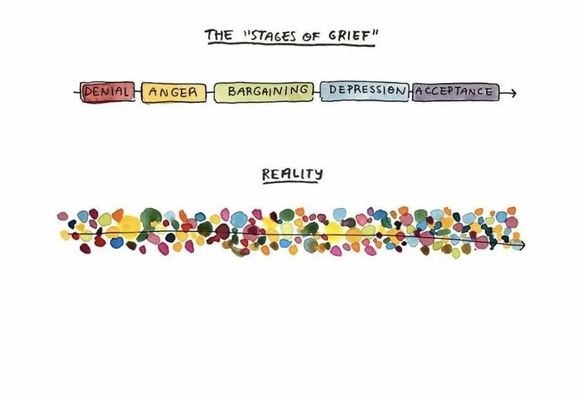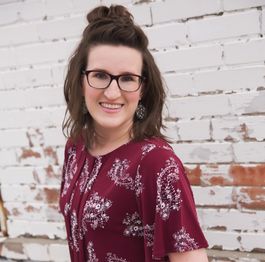
Grief and All Its Friends
May 2020 | by rebecca stewart
The first time I can remember learning about the stages of grief, I was in 8th grade, and it was the topic of that week's confirmation class. Though it both struck and stuck with me, it wasn’t until my last year in college when I was taking a Death, Dying, and Bereavement course that the light bulb regarding the concept of grief and those aforementioned stages truly clicked on. As we’ve navigated this whole new world in the grips of a global pandemic, I’ve thought a lot about grief – and the things we’re grieving.
While we’re collectively sharing this experience, there are variations to everyone’s reality. Looking back to the very beginning of our local experience, I'm thankful the kids had that week off of school while our district game planned how to tackle distance learning because my emotions were all over the map, and we needed that time to start wrapping our minds around this new normal. It was endless amounts of worry that was like having 2,225 browser tabs open (because despite everything I know and believe, I have always been a champion worrier); it was fear…it was heartbreak. It was the early stages of grief.
Now, the thing about grief is that even though there are these stages (Denial, Anger, Bargaining, Depression, Acceptance), it’s not like it’s this seamless straight line from A to Z where we check off boxes only to land at and live in acceptance. This image from The Imaginary Library perfectly illustrates what it’s like when living with grief:
Perhaps the tricky thing about grieving this time of our lives and all of the various losses that come with it, is just that – the range of losses that we are experiencing. That range, though, opens the door for unfortunate rounds of one-upmanship, where one person’s grief is deemed less than another’s. The truth is, it doesn’t matter where someone’s loss falls on some theoretical scale of suffering, we all need permission to grieve, to mourn whatever losses we’re experiencing. It’s vital.
Offering a reality check on our pandemic-related grief, George Bonanno, Ph.D., a psychologist who heads the Loss, Trauma and Emotion Lab at Teachers College, Columbia University, reminds us that though grief is difficult, it's helpful to remember that it is natural and useful. He says, “Grief is really about turning inward and recalibrating, and thinking: ‘This is not the way the world is anymore, and I need to adapt.’ It’s okay to feel grief over what we’re losing. When we do that, it allows us to let grief do its job, so that we can move on,” American Psychological Association. (2020, April 1). Grief and COVID-19: Mourning our bygone lives.
We are living in a time that is challenging our perspectives, there is loss and change and fear of the unknown. Even within our own households, we’re each experiencing our new normal in different ways, we must allow each other to feel our feelings, to give voice and name to them, and to accept the differences from our own feelings and emotions. (And, if we’re being real, isn’t that what we should have been doing all along, pandemic or no?) Just because my grief doesn’t look like yours or we’re not at the same phase, doesn’t mean that it’s wrong.
In the midst of our grief, may we be able to meet each other where we’re at in this process, and may we look for and treasure the bright spots – it’s okay to let them in; here’s to the rainbow at the end of the storm.
Originally printed in the May 2020 issue of Simply Local Magazine
Never miss an issue, check out SLM's digital editions here!






